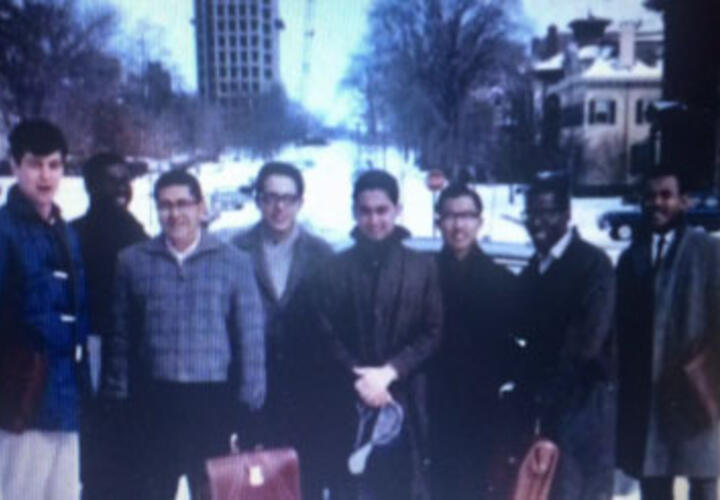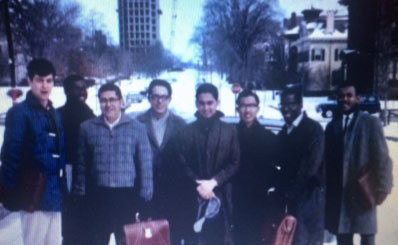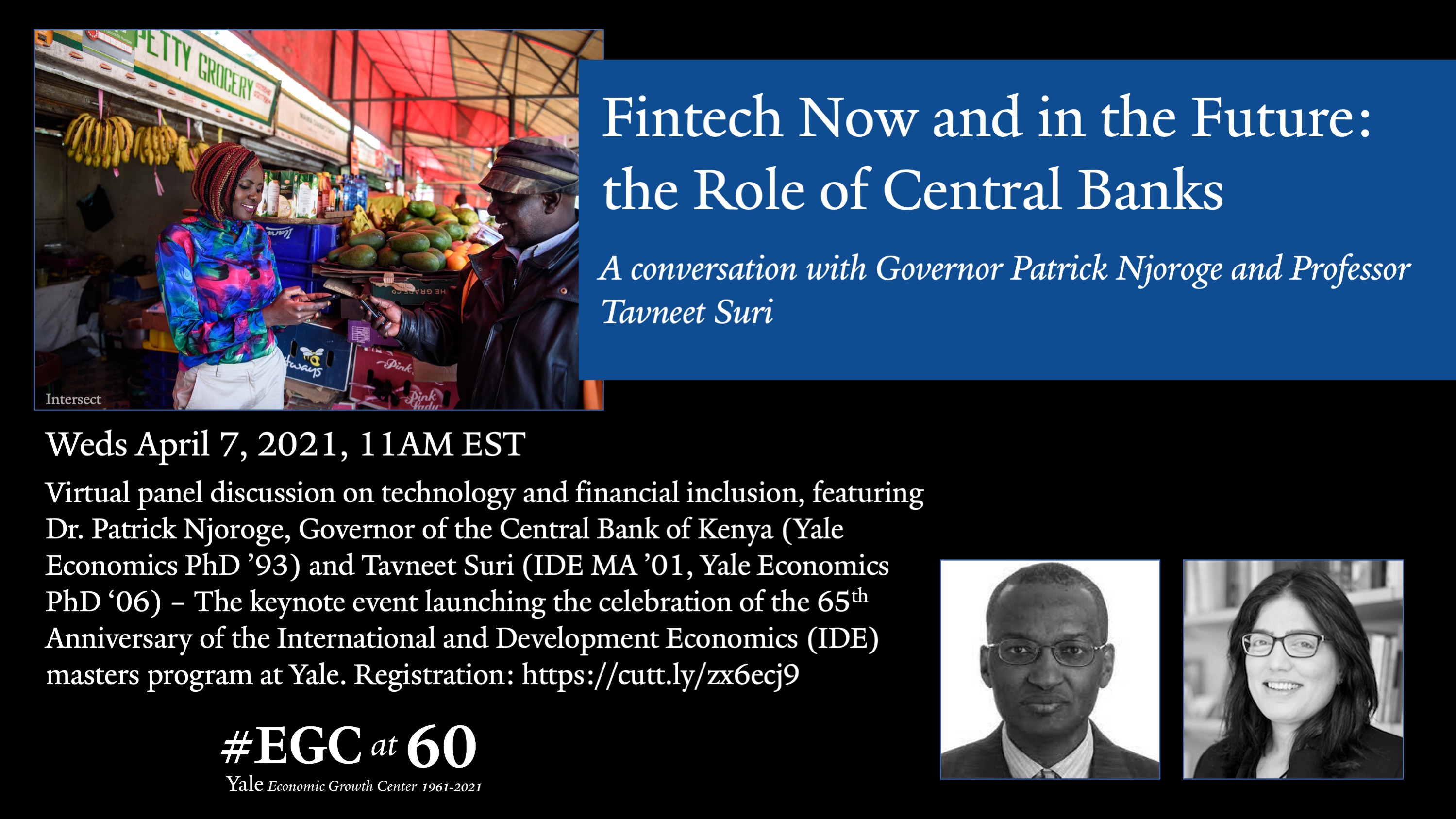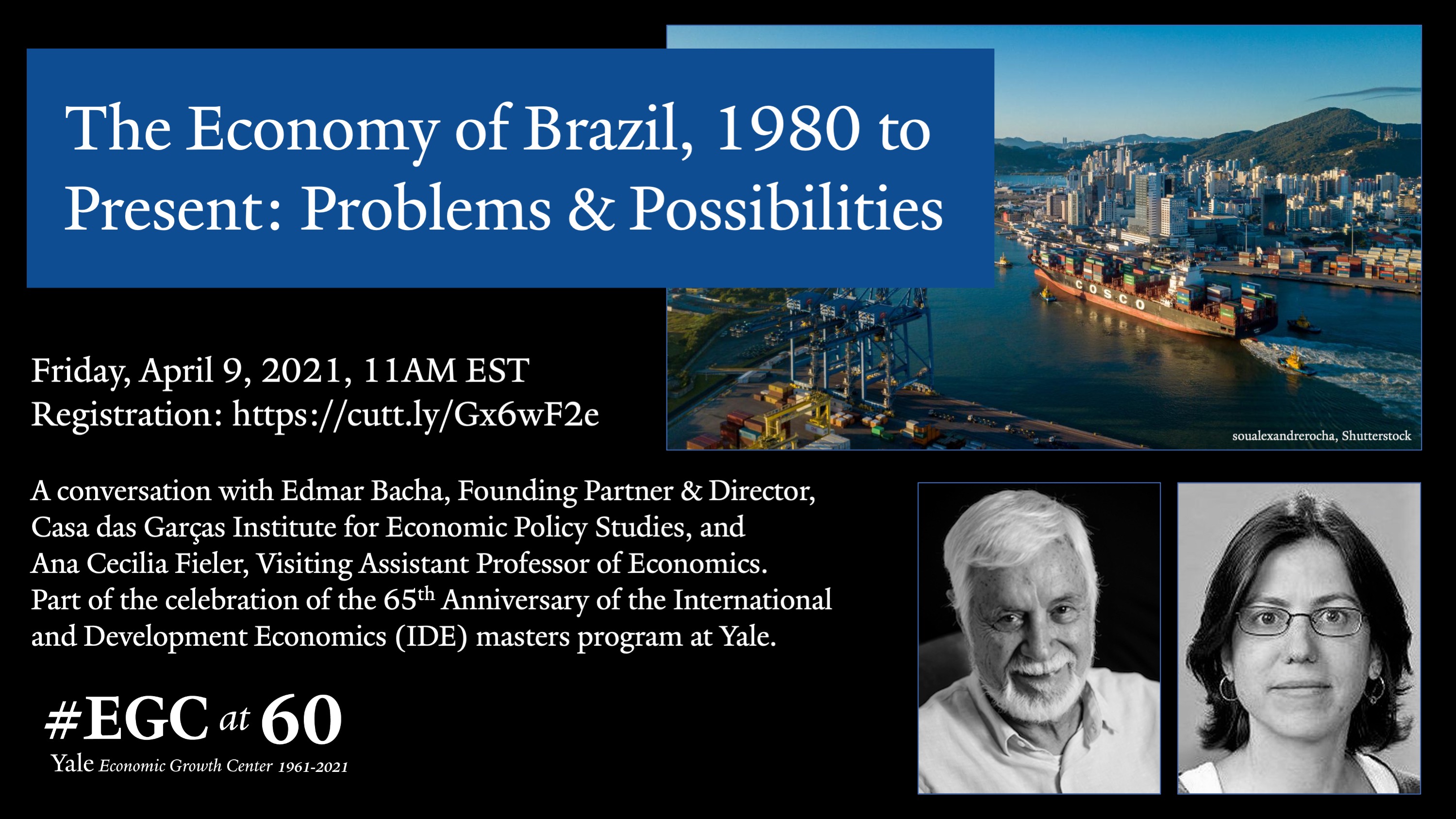EGC Quarterly Newsletter, April 2021
Our spring edition focuses on the International and Development Economics (IDE) program, as we hold events to celebrate its 65th anniversary.

Celebrating the rich history of the International and Development Economics (IDE) masters program at Yale
When the Belgian-American economist Robert Triffin arrived at Yale in 1951, he immediately started working on a problem he had recognized while working for the International Monetary Fund and Economic Cooperation Administration (the organization that administered the Marshall Plan in Europe). Post World War II, these and other multilateral organizations had been established to rebuild national economies and ensure global cooperation, but faced “great difficulties in recruiting an economic staff well trained for their work and in eliciting from the universities basic research directed at their problems.” The governments of newly independent lower-income countries faced a similar expertise gap.
Academic work should profit from, as well as help, international economic organizations – Robert Triffin, 1951
Triffin’s response was to propose a “Yale Center for International Administration” that would train students to work on economics in international organizations and governments. The program would provide fellowships for international students to take leave from government positions to study at Yale and bring their experience and perspective to Yale. “Academic work should profit from, as well as help, international economic organizations,” Triffin said.
Triffin’s proposal led to Ford Foundation funding for the International and Foreign Economic Administration (IFEA) program, a precursor to today’s International and Development Economics (IDE). Today, IDE is one of the longest-running programs of its kind, having granted masters degrees to roughly 2000 students from 80 countries over its 65 years. IDE Director Michael Boozer recounted this history in a speech at the 2005 IDE/IFEA reunion – read the text of that speech here.

IFEA students on Hillhouse Avenue in 1965. L-R: Edmar Bacha (Brazil), John Ofosu-Benefor (Ghana), Mario René Gomez (Guatemala), Guillermo Calvo (Argentina), Clóvis Cavalcanti (Brazil), Masamichi Funaoka (Japan), Frank Thompson (Trinidad and Tobago), and Roy Clarke (Barbados). Photo courtesy Edmar Bacha.
In some ways EGC is the child of IDE: IFEA’s initial success helped Yale’s development economists make a case for additional Ford Foundation funding for research activities, culminating in the founding of EGC in 1961. And today, as in the beginning, a central element of EGC and IDE’s mission remains to train the very best young scholars so as to meet the research and policy needs of developing countries.
Triffin’s proposal stated that for students, “close contacts with top officials – especially in their research field – will be essential”. This Spring, as IDE celebrates its 65th Anniversary, we are hosting a number of events for IDE students and alumni, along with two virtual panels that will be open to the public – click the links below to register.
We hope you will join us in celebrating the rich history of this remarkable program.
Rohini Pande
Henry J. Heinz II Professor of Economics
Director, Economic Growth Center

Michael Boozer
Director, International Development Economics Program & Director of Graduate Studies, IDE Program
EGC & IDE welcome a new liaison to IDE students
We are pleased to welcome Scott Runner, our new Senior Administrative Assistant who will be working with IDE students and alumni. Scott has significant experience working with college students, having most recently served as the Director of Study Abroad at the University of Bridgeport. Scott likes to help students navigate university life, play guitar, and has never met a stranger. If he isn’t responding to an email, he can be found playing with his new puppy or doing some DIY around his house in Hamden.
A tradition of top-tier job placements
Graduates of the International and Development Economics one-year masters program have gone onto positions in governmental and international organizations such as the UN, Singaporean ministries, Bank of Japan, McKinsey, and Compass Lexecon. Others head to PhD programs in Economics or other related fields, often after a year or two of working for policy and research groups, such as J-PAL, IPA, EPoD, IDinsight, the World Bank or the IMF.
Highlights from recent years:
- Malika Bhandarkar (IDE ‘05) is an Innovation Adviser at United Nations Development Program
- Celine Zipfel (IDE ‘11) is completing her PhD in Economics at LSE and will join the Stockholm School of Economics as an Assistant Professor in August
- Aletheia Donald (IDE ‘12) is an economist working at the Gender Innovation Lab, within the World Bank’s Africa Chief Economist Office
- Selen Özdoğan (IDE ‘19) is a research analyst in the Center for Sustainable Development at Brookings
- Jianhong Liu (IDE ‘19) is an RA at the Center for Global Development
Read more on the IDE website.
The IDE virtual Spring Alumni Event and 65th Anniversary Celebration
Several of our most illustrious alumni are returning for a virtual Spring Alumni Event, and we are pleased to invite the public to the opening and closing sessions. Click below for information and registration. 

IDE Research to Policy Seminar Series
Earlier this semester the IDE program launched a Research to Policy Seminar Series, where students and alumni joined in conversation with leading policymakers and economists. We are grateful to the speakers for joining:
- Penny Goldberg, Elihu Professor of Economics at Yale and former Chief Economist at World Bank Group
- Diva Dhar (IDE ‘08) Senior Program Officer for Gender, Data and Evidence at the Gates Foundation
- Costas Arkolakis, Professor of Economics at Yale
Upcoming seminars will include a career panel with Aletheia Donald (IDE '12) and Sreelakshmi Papineni (IDE '11), both of the World Bank, and guest lectures from Yale Professors David Engerman, Ilse Lindenlaub, and Tony Smith. Read more on the IDE website.
EGC Affiliate Spotlight

Professor Naomi Lamoreaux on antitrust regulation, and how economic history speaks to development.
Recent Publications

Orazio Attanasio and coauthor analyze how conditional cash transfer programs affect food prices, Penny Goldberg and coauthors use global learning data to measure human capital, and more: Explore the most recent EGC Research Summaries, journal publications, and Discussion Papers.